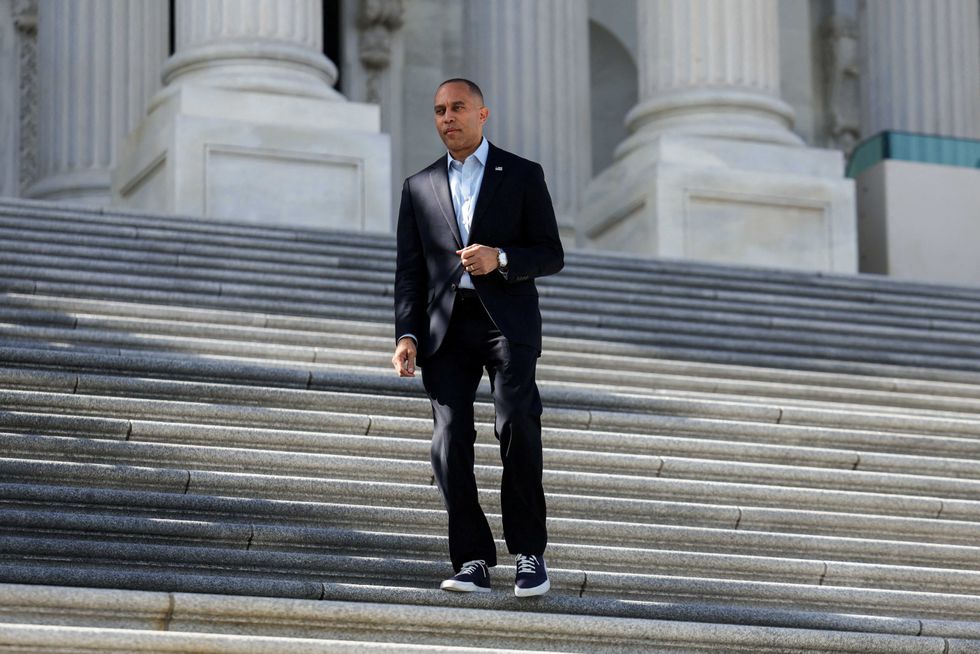Business
Lawmakers Propose Salary Withholding Amid Federal Workers’ Pay Crisis

Members of Congress are advocating for their salaries to be withheld during the ongoing government shutdown, which has left federal employees without paychecks since operations ceased on October 1. As negotiations for a funding agreement remain stalled, the House of Representatives continues its break from legislative duties, while the Senate has left for its scheduled long weekend. Concurrently, President Donald Trump is preparing for a trip to China, where he is expected to focus on foreign policy and trade issues rather than the current funding impasse.
During government shutdowns, members of Congress, along with federal judges, continue to receive their paychecks. This contrasts sharply with approximately 2 million civilian federal employees and numerous legislative staffers who are currently unpaid. Members of Congress earn an annual salary of $174,000, with leadership positions receiving higher compensation. In an effort to avoid financial strain, the Defense Department reallocated $8 billion earlier this month to ensure active duty military personnel received their salaries without interruption. It remains uncertain whether similar measures can be implemented before the next scheduled pay date, which is set for October 31.
Unlike most federal workers, Congress members have the option to receive their pay as normal, donate it to charity, return it to the Treasury, or request that their checks be withheld during the shutdown. On Thursday evening, Rhode Island Democratic Rep. Gabe Amo shared a letter from Catherine L. Szpindor, House Chief Administrative Officer, confirming that House members may opt to defer their salaries until the funding lapse concludes.
Szpindor noted that legal stipulations, including the 27th Amendment to the Constitution, guarantee Congress members their compensation. If they choose to withhold their checks, they can request payment at any time. A spokesperson for Ohio Republican Sen. Jon Husted indicated that while senators are required to be paid, Husted has chosen to have his salary held until the government is funded.
Several lawmakers have publicly requested that their salaries be withheld, including Colorado Democratic Sen. Michael Bennet, Florida Republican Rep. Kat Cammack, New Jersey Democratic Sen. Andy Kim, Oklahoma Republican Rep. Stephanie Bice, and Oregon Democratic Rep. Janelle Bynum. While spokespeople for Trump and House Speaker Mike Johnson did not address whether they are withholding their salaries, Senate Majority Leader John Thune confirmed he is deferring his paycheck.
Although Congress has previously voted on bills to officially withhold salaries during shutdowns, none have been enacted into law. Questions have arisen in past funding lapses regarding the legality of withholding member paychecks. The nonpartisan Congressional Budget Office (CBO) stated in a letter to Iowa Republican Sen. Joni Ernst prior to the current shutdown that member salaries “are required by the Constitution and are considered mandatory spending.”
“Thus, Members of Congress would continue to be paid during a lapse in discretionary appropriations,” wrote CBO Director Phillip L. Swagel. This aligns with a report from the Congressional Research Service, updated in August, which explains that lawmakers’ salaries have been funded by a permanent, mandatory appropriation since 1981. The U.S. Constitution mandates in Article I, Section 6, Clause 1 that “Senators and Representatives shall receive a Compensation for their Services, to be ascertained by Law, and paid out of the Treasury of the United States.”
The 27th Amendment further states, “No law, varying the compensation for the services of the Senators and Representatives, shall take effect, until an election of Representatives shall have intervened.” According to the Congressional Research Service, the Government Accountability Office has established that “the salary of a Member of Congress is fixed by statute and therefore cannot be waived without specific statutory authority.”
Nonetheless, members of Congress can accept their salaries and subsequently donate all or part back to the Treasury—a choice unavailable to their staff or federal employees across various departments and agencies. Those employees will remain unpaid until Congress and the president reach an agreement to fund the government and end the shutdown.
In terms of operational status, any federal worker responsible for national security or the protection of life or property is classified as essential and continues to work during the shutdown. All other federal employees are placed on furlough. Recently, the Senate failed to advance several bills aimed at providing salaries to some federal employees and contractors affected by the shutdown.
Without new congressional action, both exempt and non-exempt federal workers are expected to receive back pay under a 2019 law once government operations resume. However, Trump and administration officials have expressed skepticism regarding the provision of back pay for executive branch employees. Guidance from the House Committee on Administration confirms that all legislative branch employees will receive back pay once a funding agreement is reached. The report clarifies that “neither essential nor furloughed employees are authorized to receive compensation during a lapse in government funding.”
In conclusion, the situation underscores the disparity in compensation during this shutdown and raises questions regarding the responsibilities of lawmakers versus their constituents, who are currently facing financial uncertainty.
-

 Politics2 weeks ago
Politics2 weeks agoDallin H. Oaks Assumes Leadership of Latter-day Saints Church
-

 Business1 week ago
Business1 week agoTyler Technologies Set to Reveal Q3 2025 Earnings on October 22
-

 Sports1 week ago
Sports1 week agoSteve Kerr Supports Jonathan Kuminga After Ejection in Preseason Game
-

 Lifestyle1 week ago
Lifestyle1 week agoDua Lipa Celebrates Passing GCSE Spanish During World Tour
-

 Science2 weeks ago
Science2 weeks agoChicago’s Viral ‘Rat Hole’ Likely Created by Squirrel, Study Reveals
-

 Lifestyle1 week ago
Lifestyle1 week agoKelsea Ballerini Launches ‘Burn the Baggage’ Candle with Ranger Station
-

 Health1 week ago
Health1 week agoCommunity Unites for Seventh Annual Mental Health Awareness Walk
-

 Entertainment2 weeks ago
Entertainment2 weeks agoZoe Saldana Advocates for James Cameron’s Avatar Documentary
-

 World1 week ago
World1 week agoD’Angelo, Iconic R&B Singer, Dies at 51 After Cancer Battle
-

 Health1 week ago
Health1 week agoRichard Feldman Urges Ban on Menthol in Cigarettes and Vapes
-

 Business2 weeks ago
Business2 weeks agoMLB Qualifying Offer Jumps to $22.02 Million for 2024
-

 Business1 week ago
Business1 week agoMega Millions Jackpot Reaches $600 Million Ahead of Drawings









